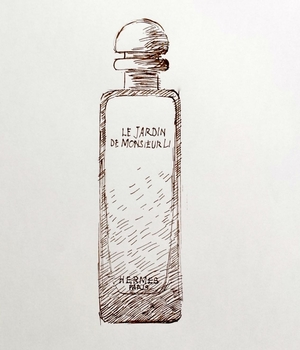Tagged With ‘China’
Hermès
Le Jardin de Monsieur Li
4 March, 2015
 The latest addition to the ‘Jardin’ range of perfumes from Hermès takes China as its inspiration, though apparently the original intention was to develop a fragrance inspired by English gardens. Sadly it seems that Jean-Claude Ellena, the company’s starry in-house perfumer, found the idea too conventional and boring, responding to the suggestion with words to the effect of ‘who wants to smell another rose garden?’
The latest addition to the ‘Jardin’ range of perfumes from Hermès takes China as its inspiration, though apparently the original intention was to develop a fragrance inspired by English gardens. Sadly it seems that Jean-Claude Ellena, the company’s starry in-house perfumer, found the idea too conventional and boring, responding to the suggestion with words to the effect of ‘who wants to smell another rose garden?’
If that’s true I think it’s a shame, since English gardens are some of the most varied and imaginative in the world, and I’d have loved to get the chance to show Ellena the all-green garden at Rousham, say, or the vast yew terraces of Powis Castle. Then again, perhaps he simply fancied travelling somewhere more exotic than could be reached within the limits of a day-trip on the Eurostar.
Either way, Chinese gardens, with their long and literary history, offer rich material for a creative perfumer, and it can’t hurt that China is a vast and expanding market for luxury brands, as attested by Hermès’ sumptuous new store in Shanghai.
Though the Monsieur Li of the title is imaginary, Ellena’s visits to Chinese gardens were made with the Chinese painter Li Xin, who moved from Beijing to Paris in 2002 and whose work forms a perfect counterpoint to Ellena’s: subtly sophisticated abstract ‘landscapes’ in washes of ink on creased rice-paper, one of which decorates the box for Le Jardin de Monsieur Li.
‘So,’ Hermès tell us, ‘Jean-Claude Ellena travelled to China. He visited gardens. Many gardens. Each one was unique but they all spoke the same language of fluidity and precision. So he created his own garden. An imaginary place inspired by the symbolic power of all the gardens he had seen. An earthly paradise in miniature, on a human scale. A retreat in which to converse with oneself and with others, and to honour one’s ancestors…
‘A vantage point from which to observe the soul and creation, where different kinds of beauty never compete but rather complement and enhance one another. A place that can only be fully experienced if one takes a partial tour of it every day, humbly and eagerly, with an eye that is ever fresh and a heart that is ever pure.’
If you’re feeling slightly queasy by now join the club, though this is par for the course for perfume PR. It probably sounds just fine in French, but high-flown purple prose translates terribly into Anglo-Saxon English, and I do wish they wouldn’t bother.
All the same it’s interesting to read what Ellena says about the smells that inspired him when he started work on Le Jardin de Monsieur Li at his house in Cabris near Grasse. ‘I remembered the scent of the pools, of the jasmine, the wet stones, the plum trees, the kumquats and the giant bamboo. It was all there, even the carp in their pond, taking the time to live to a hundred. The Sichuan pepper bushes were as thorny as roses and the leaves gave off a lemony scent.’
And can you smell this in the perfume itself? The answer is yes and no. I can certainly smell lemon and something like kumquats – a sweet, slightly strawberryish smell, though far less sweet than the delirious strawberry-kumquat scent of Black XS for Men from Paco Rabanne. I get a hint of jasmine, but it’s subtle and restrained enough for Le Jardin de Monsieur Li to be equally intriguing on a woman or a man.
It smells quite green and fresh to me as well, which I guess suggests the giant bamboo; Hermès describe the perfume’s ‘key notes’ as ‘Jean-Claude Ellena’s personal evocation of Vegetal Jasmine, Mint, Kumquat and Sap’.
What I like about this perfume most might drive other people mad, which is that I can’t quite put my finger on what it smells of, but to me that’s intriguing enough to make me want to keep wearing it. And though it’s subtle and restrained, Le Jardin de Monsieur Li has a staying power that some of Ellena’s other perfumes lack – worth noting when a 100ml bottle costs £84. Still, it’s a lovely scent and a beautiful bottle too, in heavy glass suffused by a pale shade of imperial yellow that delicately deepens from top to bottom.